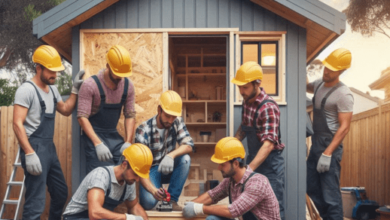
Townhomes have become an essential part of modern neighborhoods. These housing units blend the privacy of a single-family home with the convenience of shared spaces. They offer a unique housing option that contributes significantly to community development. In this article, we’ll explore how townhomes shape communities and why they matter beyond just being places to live.
Townhomes Encouraging Neighborhood Cohesion
One of the less obvious roles townhomes play is fostering neighborhood cohesion. Because these homes are built close together, residents naturally interact more than in detached houses. Shared walls and common outdoor areas create opportunities for neighbors to meet and connect. This closeness often builds trust and mutual support.
Neighborhood events, block parties, and informal gatherings happen more easily in townhome communities. These interactions strengthen the social fabric, helping people feel safe and connected. The townhomes encourage a community spirit, which is essential for healthy, vibrant neighborhoods.
Townhomes Supporting Sustainable Development
Sustainability is a growing concern in urban planning. Townhomes contribute to this by maximizing land use efficiently. They require less space per unit than detached homes, reducing urban sprawl. This compact development helps preserve green spaces and limits the need for extensive infrastructure.
Additionally, townhomes often come with shared utilities or eco-friendly designs like solar panels or energy-efficient windows. These features lower environmental footprints. By encouraging density without sacrificing quality of life, townhomes support sustainable growth in cities.
Economic Impact Of Townhomes On Communities
Townhomes bring economic benefits to local communities as well. They tend to be more affordable than single-family homes, making homeownership possible for more people. This affordability attracts a diverse population, which can lead to vibrant, mixed-income neighborhoods.
With more residents living in townhomes, local businesses often see increased demand. Restaurants, shops, and service providers thrive when neighborhoods are densely populated. This boost stimulates the local economy and creates jobs. Townhomes can act as catalysts for revitalizing areas that were once overlooked or underdeveloped.
Townhomes Enhancing Community Safety
Safety is a priority in any neighborhood. Townhome communities often have lower crime rates because residents watch out for one another. The proximity of neighbors means unusual activities are noticed quickly and reported. This natural surveillance adds a layer of security without the need for heavy policing.
Many townhome developments also incorporate safety features like gated entrances, security cameras, and well-lit common areas. Together, these elements make townhome neighborhoods some of the safest places to live. When people feel secure, they are more likely to invest in their homes and participate in community life.
Townhomes Offering Flexibility For Changing Lifestyles
Life changes, and so do housing needs. Townhomes provide flexibility for residents at different stages of life. Younger couples might start in a smaller unit and upgrade within the same community. Retirees appreciate that townhomes offer manageable upkeep compared to large houses.
Because townhomes are often located near urban centers, they appeal to those who want access to work, schools, and entertainment without long commutes. This convenience enhances quality of life and supports a dynamic community. People can stay connected to their neighbors even as their personal circumstances evolve.
Conclusion
Townhomes play a vital role in shaping strong, sustainable, and vibrant communities. They combine affordability with comfort, encourage neighborly connections, and support local economies. Their compact design aids environmental goals while fostering safety and flexibility for residents. As cities continue to grow, townhomes offer a practical and inviting solution to meet diverse housing needs. They are much more than just homes; they are building blocks of thriving communities.




